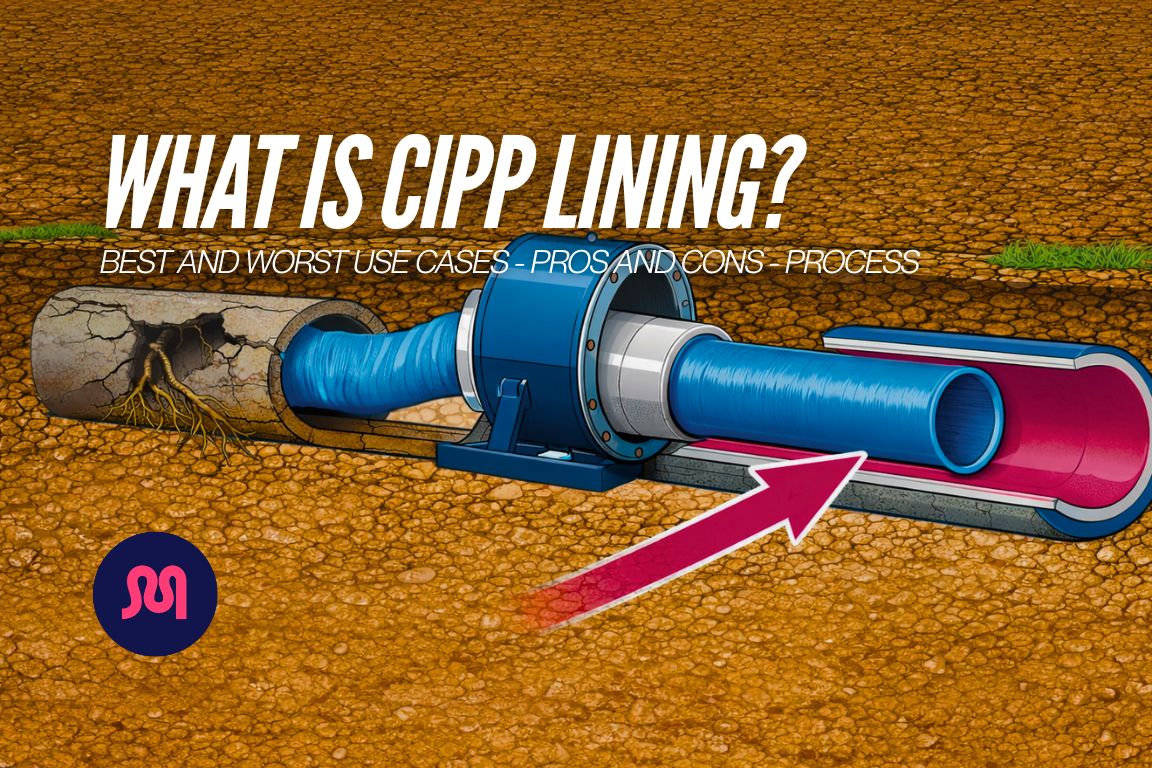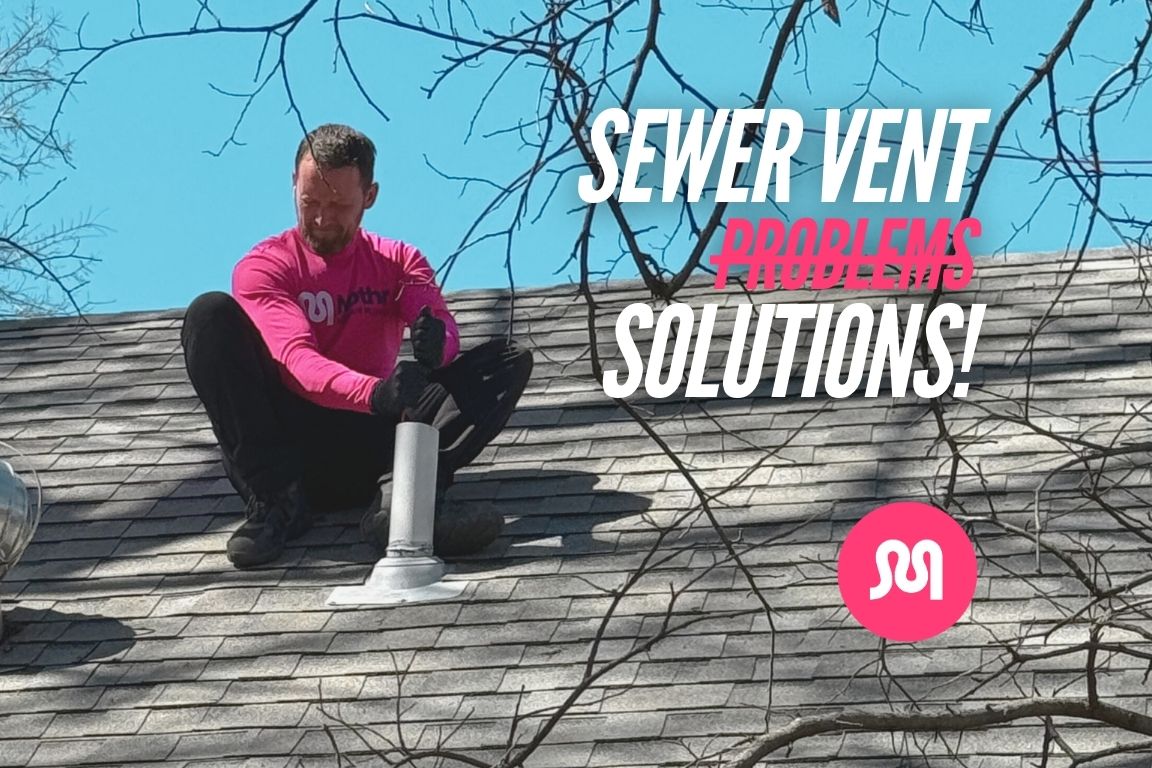8 Things Your Fridge Water Filter Doesn’t Filter Out
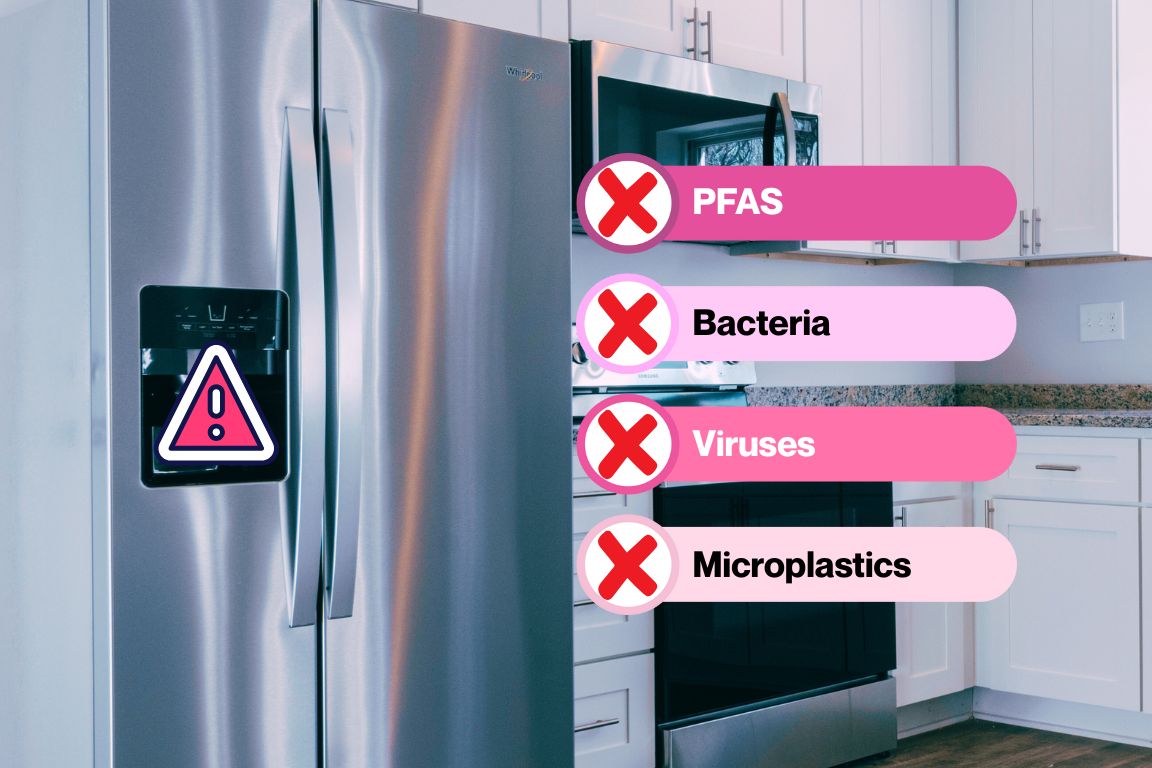
table of contents
table of contents
“I don’t need a home water filter,” a customer told us. “I use the filter on my refrigerator.” Then, we showed her a list of what her fridge water filter doesn’t filter out- and she changed her mind. (It was a long list.)
At Mother, we’re passionate about clean water. The quality of your incoming water supply impacts every pipe, tap and fixture in your home’s plumbing system- but more importantly, it affects your health. So when a “water filter” doesn’t do its job very well, we notice.
The truth: your fridge water filter is good at removing chlorine and sediment. It doesn’t remove bacteria, viruses, PFAS (forever chemicals) and a lot of other nasty contaminants.
If you’re concerned about whole home water quality, install a water filtration system. If you just want clean tap water, a reverse osmosis system under your sink does the trick. Don’t rely on your fridge to make your water healthier.
Want cleaner water in Dallas? Call Mother anytime, 24/7- we’re here. And we’ll have a licensed water filtration specialist to you at the first available appointment.
{{whole-home-water-filtration="/services/whole-home-water-filtration"}}
What Does a Fridge Water Filter Do, Anyway?
The water filter on your refrigerator removes four things from your water:
- Chlorine
- Heavy metals (lead, copper)
- Sediment
- Pesticides (some, not all)
That’s it. (Some refrigerator models remove organic compounds like radon, but that isn’t across the board.)
Your fridge water filter isn’t designed for full-scale water filtration for you and your family. It exists to serve single glasses of water and deliver cleaner ice cubes to the freezer.
Fridge water filters are too weak to remove everything
There are 3 reasons why the filter on your fridge doesn’t remove much from your water:
- It’s too small. Most inline fridge filters are 2”-4” in diameter and 8”-10” long.
- Only one filtration stage. Refrigerator water filters are small, single-stage filters. By comparison, most whole home water filtration systems have a three-stage filtration process.
- Only one filter type. The single filter on your fridge uses granular activated carbon (GAC). GAC filters are great at getting chlorine and bad odors out of your water, but they’re not designed to remove microplastics, PFAS or microorganisms.
Here’s What a Fridge Water Filter Doesn’t Filter Out

It’s a good start to get chlorine, pesticides and heavy metals out of your drinking water. But here are the eight harmful things your fridge’s water filter doesn’t remove:
- Bacteria: E. coli, salmonella, cryptosporidium
- Viruses: norovirus, rotavirus, hepatitis A
- PFAS (forever chemicals)
- Microplastics
- Arsenic
- Herbicides
- Pharmaceuticals
- Parasites
While all of these contaminants are harmful to humans, most of our customers are concerned about removing PFAS from water. Evolving research on forever chemicals links them to kidney disease, various types of cancer, pregnancy complications and childhood development issues.
(Refrigerator filters also don’t remove hard water minerals like calcium and magnesium. That’s more of a plumbing issue than a health issue, so we left it off the list.)
Why Do People Still Use Refrigerator Water Filters?
The best answer to why people still use their fridge’s water filter is force of habit. When you’re told something filters your water, it’s easy to stick a glass under the tap and not think about it.
Most of our customers who discover the shortcomings of these devices use them far less frequently, or stop altogether.
There are a few other misconceptions people have about refrigerator water filters:
- “My water smells cleaner.” While fridge water filters do remove bad odors from your water, whole home water filters also improve the smell of your water while filtering out more of the bad stuff.
- “Nothing else makes my water taste this good.” The GAC filter in your fridge unit is present in virtually every water filtration system- as one of three stages. If you like how your fridge water tastes, you’ll get the same benefit in better filtration products.
- “It’s cheaper than bottled water.” Sure, but so is every water filtration system over the long haul. Plus, you’re still replacing your fridge filter every six months.
Five more downsides to refrigerator water filters
It’s easy to pour a glass of water from the refrigerator. But there are so many aspects of fridge water filters that are downright frustrating:
- Difficult to maintain. Even our plumber find it hard to open the dispensing components and access the water line on many refrigerator water filters.
- Low storage capacity. Most fridge filters only hold 32 ounces of water at a time.
- Cold water only. Fridge water filters don’t dispense hot water- what if you want filtered water for your tea or instant coffee?
- Contamination risk. The National Sanitation Foundation (NSF) lists refrigerator water filters and ice dispensers as some of the “germiest kitchen items”.
- Clogging. Overused filters are easily clogged with hard mineral deposits and sediment.
Reverse Osmosis: A Great “One Sink” Water Filter Solution

If you want the convenience of a kitchen water filter with enhanced filtration protection, but you aren’t ready to commit to a full home water filter, reverse osmosis is a great choice for you.
Reverse osmosis filters (RO filters) use a five-stage filtration system to clear twelve harmful contaminants from your tap water:
- Sediment
- PFAS (forever chemicals)
- Dissolved salts
- Dissolved minerals (e.g. calcium, magnesium, chloride)
- Chloramines
- Heavy metals (lead and copper)
- Herbicides and pesticides
- Radiological contaminants (e.g. uranium)
- Biological contaminants (e.g. bacteria and viruses)
- Hormones
- Antibiotics
- Volatile organic compounds (VOCs)
Install an RO filter under your kitchen sink, and you’ll have all the ease-of-use of your fridge water filter- plus much cleaner, healthier water.
Want to know how reverse osmosis works? Check out our guide to RO systems and why they’re so good at reducing forever chemicals (and more) in water.
{{what-is-reverse-osmosis="/blogs/what-is-reverse-osmosis"}}
When to choose a point-of-use reverse osmosis system
A point-of-use system is one that’s installed on a single fixture- in this case, your kitchen sink. Here’s how to know if a point-of-use RO filter is the right choice for you:
- You value convenience. One quick trip to the sink is all it takes to get incredibly healthy water- dispensed cold or hot.
- You carry a water bottle everywhere. Buy a reusable water bottle or flask, and fill up at the kitchen sink before you leave the house.
- You don’t have hard water concerns. If you don’t live in a region with hard water, there aren’t as many concerns about mineral scaling ruining your plumbing (or your hair).
Three important things RO filters do better than fridge water filters
Here are three more advantages reverse osmosis systems have over refrigerator water filters:
- They’re great at fighting PFAS. A Duke University study found that point-of-use RO filters remove 94% or more of forever chemicals from tap water.
- They’re even better vs. chlorine. Reverse osmosis takes chlorine out of your water as well as chloramines- the combination of chlorine and ammonia many cities use to treat the water supply.
- Say goodbye to bacteria and viruses. Microorganisms don’t survive the reverse osmosis filtration process.
Dallas residents: interested in reverse osmosis? Call us anytime and we’ll send a water filtration expert for a consultation within 24 hours.
{{reverse-osmosis-filtration="/services/reverse-osmosis-filtration"}}
Whole Home Water Filters: The Best Overall Choice
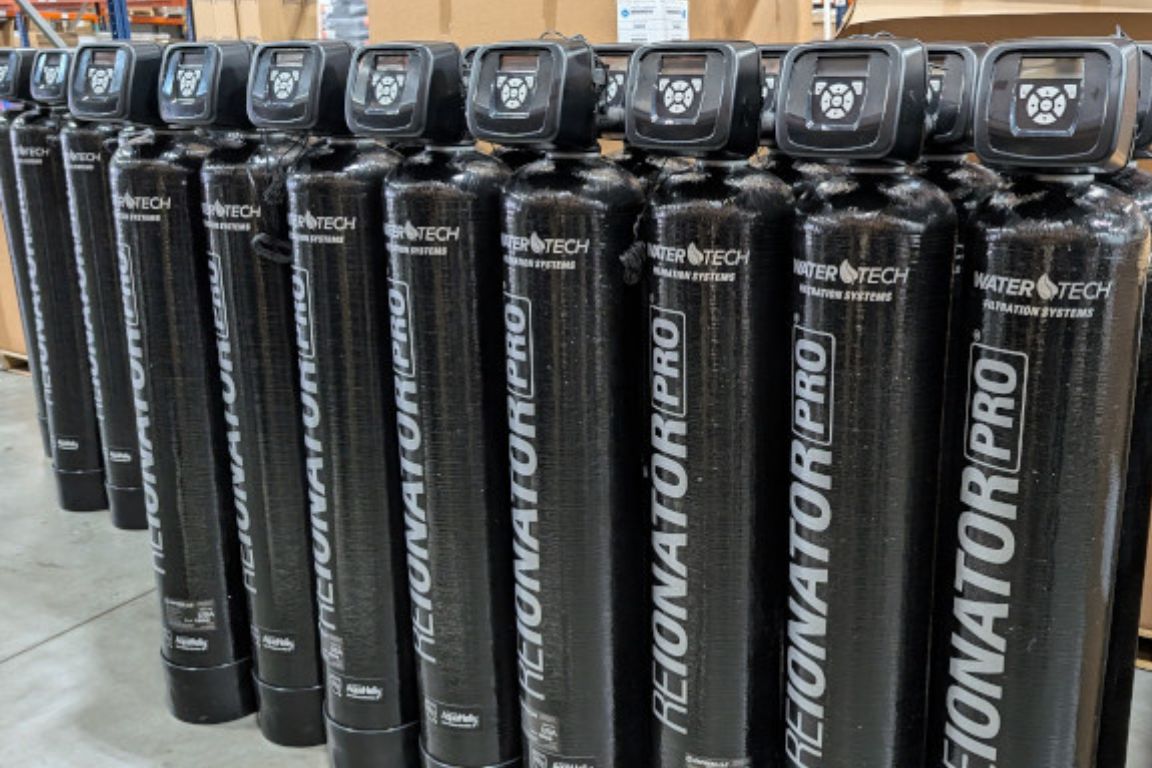
Ultimately, the best way to deliver clean, healthy water to your home is to filter it before it reaches your taps and fixtures. Install a whole home water filter where the main water line connects to your house, and you’ll do just that.
Most water filtration systems offer three-stage protection. Our team prefers quality products which provide five stages of protection against the following:
- Sediment
- Chlorine and chloramines
- Heavy metals (lead, copper, mercury)
- PFAS (forever chemicals)*
- Dissolved minerals (e.g. calcium, magnesium, chloride)
- Herbicides and pesticides
- Radiological contaminants (e.g. uranium)
- Biological contaminants (e.g. bacteria and viruses)
- Hormones
- Arsenic
- Volatile organic compounds (VOCs)
*Not every home water filter eliminates forever chemicals- the ones we install do. Ask your plumber about PFAS filtration if you have concerns.
Today’s best water filtration systems also provide water softening features- the ability to keep hard minerals from crusting your faucets and scaling your pipes and appliances.
Mother’s Master Plumbers like WaterTech products- they’re independently lab-certified to both filter and soften your water.
You’re not alone: WaterTech reports 54% of U.S. households have a water filter system, and whole home systems saw a 16% increase in the last year.
When to install a whole home water filtration system
Considering an upgrade from your fridge filter to complete home protection? Here are a few situations where a whole home water filter is a great choice for you:
- You drink from multiple taps. You want clean water when you’re brushing your teeth, too! Whole home filtration offers healthier water throughout the house.
- You suffer with hard water. If mineral scaling clogs your water heater, dulls your clothes, stains your dishes and wrecks your hair and skin, a whole home filter helps.
- You have an older home. Whole home water filters don’t just make water healthier- they keep out the minerals that cause old pipe materials to fail early.
- You have well water. Well water is more susceptible to bacteria and organic contaminants- get them out before the water reaches your house.
What whole home water filters do better than fridge filters
This one’s easy- whole home water filters remove far more contaminants than refrigerator water filters, and they apply that same protection across your entire home.
No more running to the fridge every time you want a half-healthy glass of water. Whole home filtration means you can trust every drop of water from every faucet in every room.
It’s Time to Choose a Better Water Filter
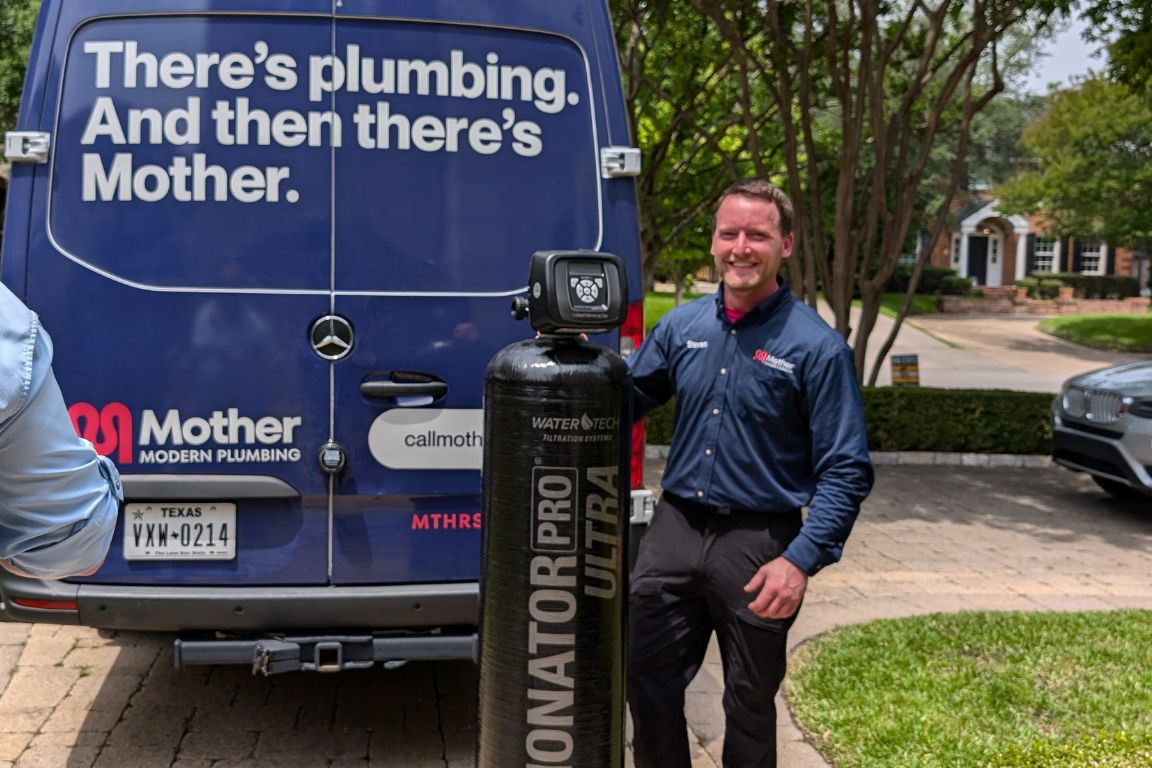
Fridge water filters don’t remove many of the most harmful things from your water- forever chemicals, bacteria, viruses and microplastics still remain.
If you get all your water from the kitchen, install a reverse osmosis filter under the sink for effective prevention against the contaminants that your fridge filter misses.
If you want complete protection that delivers healthy water to every tap and fixture, plus adds protection against hard water issues, choose a whole home water filtration system.
At Mother, we care about the quality of your water- and the best solutions for lasting health in your home.
Live in Dallas? Call us anytime with your questions about home water filtration. We’re here to talk, and we’d love to help.
{{whole-home-water-filtration="/services/whole-home-water-filtration"}}
Common Q’s about Water Filters
How long does a whole house water filtration system last?
Most whole house water filter systems should last a minimum of 10 years. Higher quality filtration systems offer longer lifespans of 15-25 years with proper inspection and routine maintenance. Your filter and water quality impact product lifespan.
What does a whole house water filter cost in Texas?
The average cost to purchase and install a whole house water filtration system in Texas is $5,000-$6,000. Whole home water filtration costs 80-85% less than complete pipe replacement.


